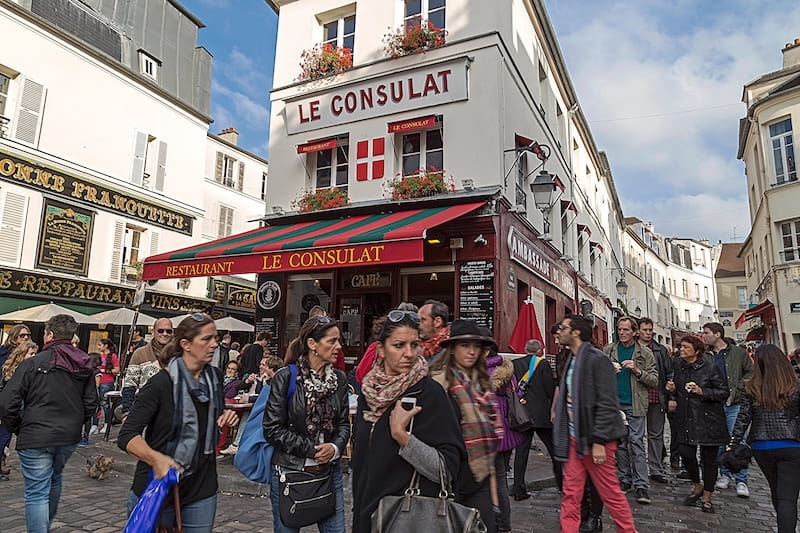Fascinated by Gallo-Roman history? Click Here to download > > > Here are 6 ways Rome affected France
- Home ›
- Destinations ›
- Paris ›
- Is Paris Safe?
Is Paris Safe? 4 myths that need debunking
Updated 1 February 2026 by Leyla Alyanak — Parisian by birth, Lyonnaise by adoption, historian by passion
Paris is generally safe for tourists; most risks involve petty theft rather than violent crime. I visit every few months (I live a few hours away in the French countryside) and violent attacks continue to be rare, especially when compared to other, non-violent crimes. Let me explain.
Once in a while, a violent episode erupts, like the tragic stabbing death in 2023 of a tourist near the Eiffel Tower. This sets people on edge and has them asking: Is Paris safe for tourists? Should I cancel my trip?
However horrifying, violent attacks remain by far the exception. A bit like an airline crash, a single event catapults public attention, but by and large, crime against tourists in Paris is of the low-level kind - usually pickpocketing, when there are crowds of tourists.
 Crowded tourist venues in Paris are the ones most like to experience pickpocketing
Crowded tourist venues in Paris are the ones most like to experience pickpocketingLet’s try to debunk some of the more persistent myths that surround safety in Paris.
Myth #1: Paris is one of the world’s most dangerous cities
Of course you’d think that, reading the news and travel advisories.
So let’s look at numbers. Many sites tabulate safety rankings for the world's major cities, and they all tend to concur that Paris falls somewhere around the middle.
According to the World Population Review, Paris ranks at #23 out of 60 cities, hovering between Taipei and Brussels. The French Interior Ministry’s 2024 crime report (site in French) says violent assaults in Paris remained below those in several comparable European capitals.
So no, Paris is not a particularly dangerous city. Yes, there is crime, but rather less of it than in many other major cities.
If you live in a large city, your chances of being a victim of violent crime are probably the same as in Paris - and depending on where you’re from, the risk could even be higher.
Myth #2: Paris is full of violent crime
Again, the statistics don’t bear this out. Nor does reality on the ground.
What IS true, according to the Ministry of the Interior, is that all types of crime are on the rise, but by far the biggest increase is theft of all kinds.
But violence isn’t as frequent as you might think.
The most common crime you’ll probably have to worry about is petty theft and street crime. Paris is full of pickpockets (the case of most any European city) and taking a few precautions should help keep your belongings safe.
Here’s how to avoid pickpockets in Paris.
COMMON TOURIST SCAMS IN PARIS
- Friendship bracelet: someone “ties” a bracelet on your wrist and demands payment.
- Gold ring: someone “finds” a ring on the ground and insists you take it, then demands money.
- Petition or survey scams: fake charity collections or “signature campaigns” asking for donations.
- ATM distraction: someone may ask for help at a cash machine; stay alert.
- Fake charity or street games: politely decline, keep your distance.
Myth #3: All of Paris is unsafe
Again, no way.
Some arrondissements are less safe than others (Paris has 20 arrondissements, or districts) but even so, only part of those arrondissements are considered “unsafe”. Even the word unsafe is an overstatement, since – a bit like Marseille – most violence is gang- or drug-related and not aimed at tourists.
Also, some of the safest areas in Paris happen to be located within a so-called “unsafe” arrondissement. The borders between arrondissements aren’t hard and fast… so throwaway phrases like “xx arrondissement is not safe” are misleading.
Myth #4: It’s dangerous to walk around Paris alone
As someone who has walked alone around Paris on my own at all hours for (many) decades, I beg to differ, as would many solo travelers.
Certainly, there are neighborhoods in which I would not wander alone at night, but there are just as many in which I happily do. Stick to the main tourist attractions, and you’ll mostly be fine - I say mostly because, as in everything, there are never any guarantess.
Use common sense, stay away from dark places by yourself, be aware of your surroundings, and there’s a 99% probability that nothing unpleasant will happen.
A few sober truths about safety concerns in Paris
Having put the security situation into some sort of perspective, there are disturbing trends that should be noted – but not stand in the way of a visit.
- Crime of most types has been on the rise in Paris in recent years, as it is pretty much everywhere else.
- When violent crimes do occur, it is usually in certain “hot” neighborhoods or suburbs or within families.
- The most common crimes against tourists are theft and petty crimes, like bag snatching.
Does that mean you should worry? Not really.
The media can help blow up an event, and governments do their bit by raising the alarm and warning their citizens vocally, especially when major sports or political events take place. We saw that during the 2024 Paris Games, when the city was on high alert - and thankfully, nothing happened.
So, as a Frenchie who lives in France and stays up to date with events, you might ask me...
Should I come to Paris?
Let me answer this way: there's no reason not to.
France does occasionally face heightened terrorist threats, but the danger of being caught up in such an event remains remote.
You may not be able to control outside events, but you can minimize the chances of them affecting you. The best way is by taking a few safety precautions:
- Carry your embassy’s hotline number and email address (along with other messaging platforms, if any), always a good idea.
- Keep your distance if you see a French police presence. The wail of sirens and flashing blue lights should not mean “get closer”, as I’ve seen a lot of people do. On the contrary, they mean stay away. You don’t know what has happened. Police may have cordoned a place off because someone dangerous is on the loose. Don’t let your natural curiosity put you in danger.
- Be particularly alert where there are crowds, such as on public transportation, in train stations and metro stations, or in crowded tourist areas.
- Avoid so-called dangerous neighborhoods at night.
- Stay in well-lit areas and highly frequented public places after sunset.
These are sensible precautions for Paris, but they work in any city.
PUBLIC TRANSPORT SAFETY TIPS
- Pickpockets are most active on busy métro lines (1, 4, 9) and RER trains to airports.
- Keep bags in front of you and phones safely put away.
- Be extra vigilant in crowded stations and during rush hour.
- Night buses and métro are generally safe, but avoid empty carriages late at night.
- If traveling with luggage, never leave it unattended.
- For emergencies while in France, call 112.
Before you go…
Paris is a major city, one of the most visited cities in the world, on a par with London or Washington in many ways, and while it has all the advantages of a great cosmopolitan city, the "City of Love" also has its disadvantages. Crime is one of those.
As you do when you’re home, try to focus on the positive because you’ve waited a long time to see this great city, and you deserve to enjoy it. You can be cautious and aware but still have fun!
Petty theft is the mostly likely crime you might face in Paris. I personally have never experienced crime in Paris, yet on three different visits to Barcelona, I was robbed each time. No violence - just a pain.
Here are a few items to help keep your belongings safe:
- a cross-body anti-theft bag (I use Pacsafe bags)
- lanyards for your phone, around your neck or for your wrist (I use both).
Violence is relative, and the kind you occasionally encounter in Paris is far less frightening than the physical violence you might encounter in other, truly dangerous cities.
Finally, here are a few Paris areas to avoid, or at least visiting cautiously.
Did you enjoy this article? I'd love if you shared it!

